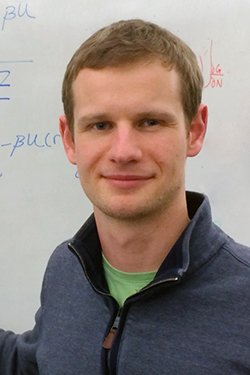Jeremy Palmer
2014 Regional Award Winner — Post-Doc

Current Position:
Assistant Professor
Institution:
University of Houston (Previously at Princeton University)
Discipline:
Chemical Engineering

Current Position:
Assistant Professor
Institution:
University of Houston (Previously at Princeton University)
Discipline:
Chemical Engineering
Recognized for: Computational investigation of the role of water in biological systems and its phase behavior in super-cooled states
Areas of Research Interest and Expertise: Condensed Matter Theory, Molecular Simulation, Liquid State Anomalies and Computational Materials Design
Biography:
PhD, Chemical Engineering, North Carolina State University
BS, Biomedical & Chemical Engineering, Johns Hopkins University
Jeremy Palmer studies condensed matter systems using advanced theoretical and computational methods. His current research focuses on exploring the microscopic origin of water’s unusual physical properties, such as the marked decrease in liquid water’s density upon cooling below the freezing point. His recent work has demonstrated that some models of ultra-cold water (such as exists in high-altitude clouds) can spontaneously phase separate into two distinct liquid phases before freezing. The presence of these two liquids may provide a unifying theory that reconciles many unexplained experimental observations regarding cold water’s distinctive behavior. Dr. Palmer also investigates the role of water (or lack thereof) in regulating the properties of biological therapeutics that are preserved as freeze-dried solids for long-term storage.
In his doctoral dissertation, Dr. Palmer developed computational methods to investigate the complex microstructure of porous carbon materials that are widely used in water filtration, environmental remediation and energy storage and production technologies. Such materials are extremely challenging to characterize experimentally due to their amorphous or disordered nature. The computational methods that he developed provided significant insight into how their structure may be finely tuned by altering synthesis procedures in order to derive new materials with significantly enhanced performance characteristics.
"I develop computer models that describe how materials like liquids, glasses and proteins behave at the molecular level in order to better understand nature’s design and to guide the development of new technologies that address problems related to sustainability and medicine."
Key Publications:
Other Honors:
2008 NSF East Asia and Pacific Summer Institute in Japan Fellow
2009 ISSHAC 7 Conference, Kazimierz Dolny, Poland – Travel Award